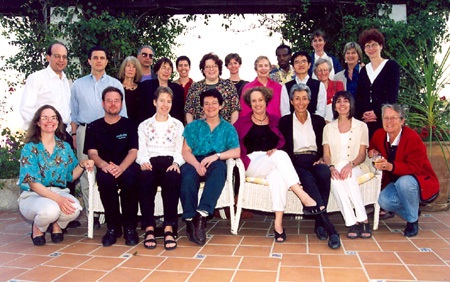New Directions in Kinship Study: A Core Concept Revisited
Date
Mar 27 - Apr 4, 1998Organized by
Sarah Franklin and Susan McKinnonLocation
Hotel Bon Sol, Illetas (Palma), MallorcaParticipants
- Mary Bouquet Utrecht University, The Netherlands
- Janet Carsten University of Edinburgh, UK
- Charis Cussins Cornell University, USA
- Carol Delaney Stanford University, USA
- Gillian Feeley-Harnik Johns Hopkins University, USA
- Sarah Franklin Lancaster University, UK
- Christine Gailey Northeastern University, USA
- Cori Hayden University of California, Santa Cruz, USA
- Stefan Helmreich Stanford University, USA
- Signe Howell University of Oslo, Norway
- Jonathan Marks University of California, Berkeley, USA
- Susan McKinnon University of Virginia, USA
- Michael Peletz Colgate University, USA
- Rayna Rapp New School for Social Research, USA
- Daniel Segal Pitzer College, USA
- Martine Segalen Université de Nanterre-Paris X, France
- Sydel Silverman Wenner-Gren Foundation, USA
- Verena Stolke Universidad Autónoma de Barcelona, Spain
- Marilyn Strathern University of Cambridge, UK
- Pauline Strong University of Texas, USA
- Melbourne Tapper University of Texas, USA
- Kath Weston Arizona State University, USA
- Yunxiang Yan University of California, Los Angeles, USA
ORGANIZER’S STATEMENT: This symposium brought together 21 international scholars engaged in research on kinship within social and cultural anthropology, science studies and biological anthropology. The aims of the conference were threefold: to assess the widely noted decline in older approaches to kinship studies within anthropology; to bring together for the first time new approaches to kinship study that have emerged at the intersection of anthropology and cultural studies of science, gender, race, nationalism and transnational political economy; and to map the connections among the various dimensions along which kinship study is developing. The symposium focused primarily on a range of “new” sites of kinship production, including those resulting from reproductive technologies, genetic screening, information technology, contests over intellectual property, and transnational flows of persons and capital. At the same time, it considered kinship formations and formulations in areas of the world that have long been the traditional sites of kinship study (including Melanesia, China, and Malaysia). Without reaching a conclusion as to “what kinship is all about,” and instead continuing in a tradition within which many competing definitions of kinship coexist, the symposium clearly demonstrated the revival of kinship study in contemporary anthropology – at the same time suggesting it was never as much in decline as widely believed. In the process, it charted the transformations in such ideas as biology, nature, culture, substance, genealogy, and property that have long been central to kinship study and that continue to shape the rapidly expanding horizons of kinship as it is reconfigured in the contemporary world. Revised papers from the symposium were presented at two panels at the meetings of the American Anthropological Association in November 1998, and will also appear in a volume scheduled for publication in 1999.
Wenner-Gren Symposium #123
